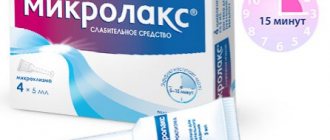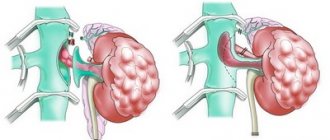Constipation is an extremely unpleasant but common problem that can occur at any age, including newborns and preschool children. Therefore, every mother should know how to help a child with constipation. If a child suffers from constipation for a long time, then consultation with a doctor is mandatory. This phenomenon is caused by various reasons, so before taking any action, you need to take a closer look at the child’s condition.
Constipation in infants causes anxiety and crying
Signs of constipation in a baby
The frequency of bowel movements depends primarily on the age of the baby. For example, when breastfeeding, 5-8 bowel movements are considered quite normal. When bottle-fed, babies should poop at least three times a day. We can talk about constipation in a child only when the baby does not have a bowel movement for a whole day. Parents also need to pay attention to the consistency and color of stool. They should have a yellow mushy state.
The main signs of constipation include the following:
- the child cannot go to the toilet for more than a day;
- loss of appetite;
- colic;
- on palpation the tummy is hard and tense;
- feces are hard, spherical, and have a pronounced putrid odor;
- increased gas formation;
- anxiety;
- sleep disturbance;
- when emptying, the baby knocks his feet and cries;
- Sometimes you can see streaks of blood in the stool.
Note. The symptoms described above indicate the development of constipation in a child; they should be considered together. Only a specialist will be able to determine whether they are evidence of some kind of pathology, or whether physiological changes are occurring in the functioning of the digestive organs.
Gymnastics for babies is an excellent solution for eliminating constipation
Mechanical stimulation of the intestines with a thermometer
Most parents know what constipation is and how it manifests itself in infants. If there is no bowel movement for several days and uncomfortable symptoms appear, the child needs help to facilitate bowel movements.
There are many methods that can be used to speed up the passage of gases and feces, some of them are also suitable for infants.
A thermometer for constipation refers to methods of mechanical stimulation of receptors located in the walls of the rectum.
Their irritation with the inserted thermometer leads to increased peristalsis, due to which accumulated feces are pushed out of the intestines.
This method was used decades ago. And many grandmothers still advise young parents to use a thermometer to facilitate bowel movements. Should we trust the experience of the previous generation? Definitely not on this issue.
Today, there are many means and ways to combat constipation, which, in principle, cannot harm a child of any age, especially for newborn babies.
Using a thermometer can lead to the most unexpected and sometimes irreversible consequences. And this method of eliminating constipation can only be resorted to in extremely exceptional cases.
Types of childhood constipation
According to the nature of the course, constipation is divided into acute and chronic. If a baby experiences difficulty with bowel movements for more than three months, his constipation becomes chronic; if less, it is considered acute.
Taking into account the etiology of the disease, the following types of constipation are distinguished:
- Nutritional. This is the most common type, their cause is hypovitaminosis, dehydration or poor nutrition.
- Organic. They arise due to congenital anomalies in the digestive canal (scars and neoplasms in the rectal area).
- Intoxicating. They develop due to poisoning, including medications.
- Dyskinetic. They occur against the background of intestinal hypotension, that is, weak or impaired intestinal motility.
- Conditioned reflex. The reason for their development is stress, fear, psychological suppression of the urge to defecate, including hemorrhoids and anal fissures.
A tummy massage will help restore bowel function
Causes of constipation in a baby
In babies under one year of age, difficulties with going to the toilet are associated with the following factors:
- the presence of constipation in a nursing mother;
- insufficient amount of water in the baby’s diet;
- improper potty training;
- nervous disorder;
- Hirschsprung's disease;
- lack of parental attention;
- dysbiosis caused by taking antibiotics;
- improper diet of the baby;
- anomalies of the rectum (cracks in the anus, hemorrhoids);
- metabolic disorders;
- anal atresia;
- malnutrition;
- dehydration;
- diaper dermatitis in the anus;
- non-compliance with diet by a nursing mother;
- introducing complementary foods into the baby’s diet;
- the presence of certain pathologies (poliomyelitis, hypothyroidism, rickets);
- incorrectly selected formula for artificial feeding;
- congenital anomalies of the digestive system;
- lactase deficiency.
In 12-month-old children, constipation may also occur for other reasons:
- obesity;
- excessive shyness (the child does not want to defecate in kindergarten and other crowded places);
- stress;
- fright;
- unbalanced diet (excessive consumption of flour products, fatty foods);
- taking certain types of medications;
- physical inactivity;
- excessive physical and mental stress;
- helminthic infestations;
- pathologies of the gastrointestinal tract (gastritis, enteritis, pancreatitis).
With constipation, there is sometimes an increase in body temperature
First aid for constipation
How you can help a baby with constipation is a pressing question for all young parents. To relieve constipation, pediatricians recommend doing the following:
- apply a warm diaper to your stomach;
- do a massage (with gentle movements with a warm hand, running clockwise over the baby’s tummy) and the “bicycle” exercise;
- give the child glycerin suppositories;
- give laxatives (they should only be used as prescribed by a doctor).
A doctor should be called if the following symptoms are detected in a child:
- decreased appetite;
- refusal to eat;
- flatulence;
- severe abdominal pain;
- frequent vomiting;
- blood in the stool;
- The child’s feces and urine are dark in color with a pungent putrid odor.
If conservative methods of relieving constipation do not help, you can try medications that irritate the intestinal sphincter. In general, it is undesirable to do this, but when the baby is unwell, there is no other choice. In such cases, traditional healers recommend a piece of potato or baby soap. The latter can cause burns, so you need to be extremely careful when using it.
If you don’t have laxative suppositories on hand, you can try “tickling” the baby’s anus with a cotton swab. Before use, lubricate it with vegetable oil or baby cream, then carefully insert a cotton swab inside and gently twist it. After such actions, the child should have a reflex bowel movement. Good results are obtained when using Microlax microenemas. You can buy it at any pharmacy.
Abdominal massage and gymnastics
A tummy massage helps with constipation. The baby is stroked on the stomach strictly clockwise ten minutes before meals several times. They also repeat the movements some time after eating.
Movements should be smooth and light, there is no need to put pressure on the stomach. Once the baby is two weeks old after birth, he can be placed on his tummy for a short time before eating.
A little gymnastics is also useful. The mother should take the baby’s feet in her arms and place the baby on his back. You need to start making rotational movements with your legs, reminiscent of riding a bicycle, first in one direction and then in the other.
Abdominal massage and gymnastics for a breastfed baby should be done regularly.
How to quickly get rid of constipation
To eliminate signs of constipation in infants, you can use traditional medicine recipes or medications.
Folk remedies at home
Treatment of constipation using alternative medicine methods is available only in cases where this problem is irregular or appears for the first time. Then auxiliary methods of traditional medicine will help reduce the negative impact of drug therapy.
An effective way to combat constipation is porridge made from wheat germ. Grind two tablespoons of raw material into flour, then pour in 1 cup of boiling water and leave for 5-10 minutes. It is better to give your baby this porridge in the morning. There is no need to add sugar or salt to it.
To stimulate intestinal motility, you can use sterilized vegetable oil (olive, sunflower). You can prepare it yourself at home or buy it at a pharmacy. The medicine is given to the baby once a day, 1 teaspoon before meals.
If you have constipation, boiled beets or carrots help a lot. Cooked vegetables are grated on a fine grater or chopped using a blender, and then seasoned with vegetable oil. You can add a little sour cream and prunes to the dish. It is better to give the product to the child in the evening so that the stool returns to normal by morning.
Drug treatment of constipation in infants
Pediatricians know what to give a baby for constipation. They recommend using medications with a mild, gentle laxative effect. Such means can be used:
- Prelax;
- Duphalac;
- Buscopan;
- Lactusan;
- probiotics;
- suppositories.
In addition, microenemas, gas tubes or classic enemas can be used as a means to combat defecation difficulties. The volume of an enema for a baby with constipation depends on his age. Up to 2 months, the amount of water in the pear should not exceed 15 ml, up to 6 months - 30 ml, up to 15 months - 60 ml.
In addition, the local pediatrician can prescribe medications to the patient that normalize the intestinal microflora, namely:
- Primadophilis is a probiotic, bioactive supplement. Effectively inhibits the proliferation of pathogenic microflora in the intestines.
- Acipol - contains lactobacilli, quickly eliminates the cause of constipation, normalizes intestinal function.
- Bifidumbacterin is a broad-spectrum drug. For the treatment of children it is used in the form of suppositories. This remedy can be prescribed even to newborns.
In the modern pharmaceutical market, customers are presented with a wide selection of drugs for constipation for infants. The most effective means of combating constipation are rectal suppositories:
- Glycerin suppositories. The active ingredient of the drug is trihydric alcohol - glycerol. The medicine has a mild laxative effect. Glycerin suppositories stimulate intestinal motility, dilute stool and facilitate their removal. To normalize intestinal function, suppositories are taken for a week. It must be borne in mind that with long-term use of such medications, side effects may occur in the form of allergies, diarrhea and intestinal obstruction.
- Sea buckthorn candles. They will help save the child from suffering. The bioactive substances of the drug envelop the intestinal walls and help painlessly get rid of hard feces. In addition, these suppositories have antimicrobial, antiviral, anti-inflammatory and wound healing effects.
- Gas-forming suppositories. The main bioactive compound in such preparations is sodium bicarbonate. This substance forms carbon dioxide, stimulating the receptors of the mucous membrane, feces are literally “pushed” out. The most common are Calciolax and Ferrolax. These drugs have virtually no contraindications, so they can be used even at an early age.
- Candles with papaverine. The active ingredient of the drug eliminates spasms of smooth muscles, which promotes the excretion of feces. These candles can be used by children from 6 months.
Advice. If after several doses the suppositories do not produce the desired effect, you must consult a specialist.
What not to do
When the first negative symptoms appear that indicate constipation, you should definitely consult a doctor who will make the correct diagnosis. You should not self-medicate, which can lead to serious health problems.
Under no circumstances should you do the following:
- You should not use laxatives on your own to treat constipation in one-month-old babies. Only a doctor can prescribe any medications.
- Traditional methods of treatment are also unacceptable for children in the first year of life. Each remedy or method has its own contraindications and can cause serious problems with the child’s health. Therefore, it is better not to take risks, but to immediately consult a doctor.
- If there is no bowel movement for two days, you should immediately consult a doctor. Constipation can be a symptom of one of the diseases of the digestive system.
Possible consequences and complications
Frequent constipation in a baby can lead to the development of serious complications:
- Stagnation of feces leads to intoxication of the entire body. During the decay of protein substances, a huge amount of ammonia is released. Accumulating in the body, it causes fatigue, irritability, and sleep disturbances in the child. Due to constant intoxication, mental activity decreases, allergic reactions develop, memory and concentration deteriorate. The nervous system suffers, metabolism is disrupted.
- Regular constipation can lead to rectal prolapse.
- Painful defecation leads to the development of fears about the process.
- Due to problems with defecation, the child develops cracks in the rectum and streaks of blood on the surface of the stool.
Important! The consequences of constipation in children can be the most severe: from the inability to defecate independently (without an enema or laxatives) to the extreme form of the consequences of constipation - encopresis, a potential cause of disability for the baby.
It is best to treat newborns for constipation from an early age.
When you need to see a doctor urgently
It is necessary to immediately seek medical help at any time of the day if:
- Stool retention is accompanied by severe fever, which may indicate fecal intoxication.
- Constipation in your child is accompanied by nausea and vomiting.
- There is blood in the stool, which can be a sign of both rectal fissures and serious diseases.
Constipation in a baby can significantly complicate your life, but simple and accessible recommendations will help restore your peace of mind and your baby’s cheerfulness.
Preventing constipation in newborns
It is much easier to prevent any problem than to treat it. To prevent constipation in newborns, you should adhere to the following recommendations:
- establish proper nutrition for the baby;
- ensure normal drinking regime for the child;
- During breastfeeding, the mother should drink at least 2 liters of water per day;
- in 5 minutes Before feeding the baby, you need to lay the baby on his tummy;
- regularly do gymnastics with your child;
- protect the baby from stress;
- prevent the baby from overheating;
- If problems arise, the child must be shown to a pediatrician.
When constipation is detected in a child, parents are obliged to take immediate measures to solve the problem so that their beloved child does not get worse. You can find out what you can give your child for constipation before the doctor arrives from your local pediatrician.
Laxatives
Enema for infants
There is no need to give laxatives to your baby, especially on your own. They can only be prescribed by a doctor. A one-month-old baby can be given lactulose-based laxatives for constipation, since they have no side effects and are not absorbed by the body.
The dosage of the drug and the course of treatment should be prescribed by a pediatrician. Sometimes a laxative is prescribed to the mother so that it enters the baby’s body through breast milk.
A cleansing enema with boiled water is given to a baby only as a last resort , when other measures are ineffective.
Most often, such enemas are done once for first aid, because with prolonged use they can cause intestinal dysbiosis. It is best to purchase a Microlax children's enema at a pharmacy. We have written how to install it in the instructions for use.
Also, for constipation, doctors sometimes prescribe glycerin suppositories in children's dosages. If you don’t have one, then you can buy adult candles, simply reduce their volume by dividing them into several parts. They use suppositories and insert them into the anus; you can pre-lubricate it with Vaseline for better passage. Emptying occurs quite quickly.
https://youtu.be/0GeXv1g4O-4











